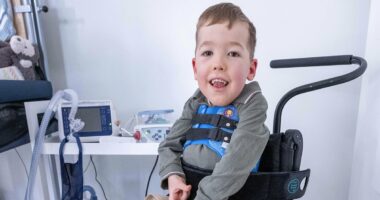Share this @internewscast.com
A psychologist has cast light on a lesser-known dementia type and its primary symptoms. CEO of The Dementia Care Hub, Dr Kellyn Lee, conveyed her expertise at a time when dementia is affecting more than 944,000 people in the UK.
Alzheimer’s Research UK figures show that out of every 100 dementia sufferers, approximately 10 to 15 have Lewy Bodies. This type is considered the third-most prevalent form of dementia after Alzheimer’s and vascular dementia.”Quite a few people have been asking for me to talk about the different types of dementia,” Dr Lee explained in a recent TikTok.
“So, today we are going to talk about Lewy Body dementia. So, Lewy Body dementia, this is caused by abnormal proteins that attach themselves to parts of the brain.
“What that does is it inhibits things like … people will have difficulty with memory, they can have difficulty with carrying out the everyday tasks and the usual activities that they have done for a long time. It can affect somebody’s behaviour, it can affect somebody’s mood, and it can also really affect their alertness.
“So, with Lewy Body dementia, we may see kind of a vagueness at times.” Although Lewy Body symptoms differ on a case-by-case basis, Dr. Lee noted that common indicators include ‘fluctuation in consciousness’, significant communication difficulties, and visual hallucinations.
She also highlighted a symptom known as ‘spontaneous Parkinsonism’, which is characterised by potentially fluctuating slowness of movement, rigidity and even tremors typically associated with Parkinson’s disease. This can severely impact a person’s ability to move around safely.
Dr Lee continued: “Ok, so slow movements, this kind of shuffling on feet. So, it affects walking. Also a real stiffness within the body and this has implications in terms of balance issues.
“So, people with Lewy Body dementia may be more prone to fall. Also a tremor, so a tremor may be present. So people who maybe used to be really handy, do DIY, painting, anything like that, they might find these sorts of things difficult because they actually can’t function as well as they did.”
Unlike other types of dementia, significant memory loss can occur more gradually with Lewy Bodies, while challenges with visual perception and alertness may potentially be more prevalent from the onset.
Sadly, there is currently no cure for Lewy Bodies or any other form of dementia, but treatments are available to help alleviate some of its symptoms. These include various medications, cognitive stimulation therapies, and rehabilitation.
If you’re worried about your own symptoms or those of someone close to you, it’s advisable to consult a GP for the best guidance available.
Find out about the symptoms you need to watch out for and get health advice with our free health newsletter from the Daily Express
Potential red flags of Lewy Body dementia
While symptoms differ from one individual to another, the NHS has stated that they might include:
- Depression and anxiety
- Slow movement, stiff limbs, tremors (uncontrollable shaking) and shuffling when walking – similar to Parkinson’s disease
- Marked swings between alertness and confusion or sleepiness – this can happen unexpectedly and change over minutes or hours
- Disturbed sleep – this could be talking in sleep, acting out dreams or sleepiness during the day
- Understanding problems
- Memory issues (but significant memory loss may not occur until later on)
- Visual perception challenges
- Language difficulties
- Seeing or sometimes hearing things that are not there (hallucinations) – these can range from pleasant to distressing
- Fainting, unsteadiness and falls
- Thinking speed problems
- Concerning changes in judgement
- Dysphagia (swallowing problems)















